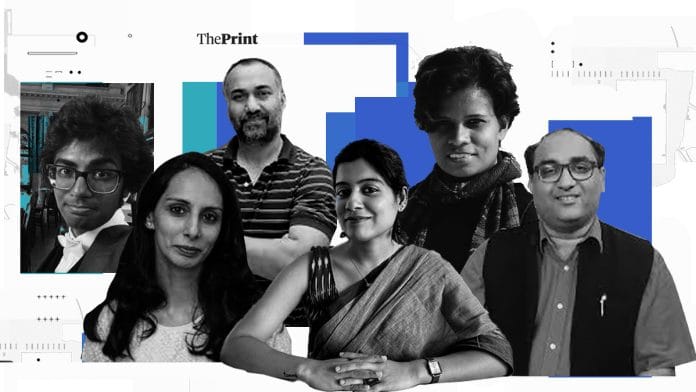In 2018, ThePrint’s list of India’s leading intellectuals captured the zeitgeist like nothing else. Public conversation about it lasted for weeks.
This year, we bring you a new list—the intellectuals to watch out for in the next decade.
ThePrint formed a jury panel of experts to nominate a list of thinkers in the fields of geostrategic affairs, economy, social science, and political thought. Members of the jury decided the names individually and in complete secrecy.
For the social science list, the jury picked intellectuals who are offering data-driven analyses of social issues, reshaping the study of history and sociology, and addressing urgent social justice concerns through creative writing and public engagement.
Jurors: ThePrint’s panel of jurors includes rights activist Shehla Rashid, sociology professor Chandan Gowda, writer-historian Manu PIllai, and author-media critic Santosh Desai.
 Amit Varma: Writer and podcaster
Amit Varma: Writer and podcaster
Varma’s The Seen and the Unseen is perhaps India’s top audio podcast, featuring deep dives into everything from sport and society to history and gender. His platform brings together India’s brightest and most interesting minds, fostering discussions that challenge conventional thinking.
 Joyojeet Pal: Associate Professor, University of Michigan
Joyojeet Pal: Associate Professor, University of Michigan
Pal uses unorthodox methods to understand Indian society and politics through Artificial Intelligence and social media. He has recently shifted his focus to studying Indian-Americans in the US, exploring how diaspora communities navigate their identities in a foreign context.
 Jacinta Kerketta: Poet, writer, and independent journalist
Jacinta Kerketta: Poet, writer, and independent journalist
Her morally and politically urgent poetry and journalistic writing in Hindi bear creative witness to the violence that confronts tribal communities in contemporary India. Kerketta’s work for India’s Adivasis seeks to amplify marginalised voices and advocate for social justice.
 Kanad Sinha: Assistant Professor, The Sanskrit College and University, Kolkata
Kanad Sinha: Assistant Professor, The Sanskrit College and University, Kolkata
Proficient in Bangla, Sanskrit, and English, his scholarship takes fresh questions to Indian epics and renews deep intellectual curiosity about them in the present. Sinha’s interdisciplinary approach enriches discussions on cultural heritage and its relevance today.
 Khalid Anis Ansari: Associate Professor of Sociology, Azim Premji University
Khalid Anis Ansari: Associate Professor of Sociology, Azim Premji University
Besides doing valuable research on the history and politics of the understudied Pasmanda movement in the country, he engages the larger public on policy-relevant issues through his writings in the media, making complex sociological concepts accessible.
 Nishant Shah: Associate Professor, Chinese University of Hong Kong
Nishant Shah: Associate Professor, Chinese University of Hong Kong
Nishant’s work focuses on the many ways digital technologies are shaping cultural, political, and social life in contemporary India. He excels at examining the implications of change-in-the-making with a combination of academic rigour and accessible communication.
 Paromita Vohra: Filmmaker and columnist
Paromita Vohra: Filmmaker and columnist
Vohra presents a deeply thoughtful, nuanced, and original feminist perspective on society. She cuts through layers of standardised ideological frameworks to provide a refreshing interpretation of contemporary issues affecting women. She is also the founder and creative director of Agents of Ishq, a multi-media platform about sex, love and desire.
 Pratinav Anil: Lecturer in History, University of Oxford
Pratinav Anil: Lecturer in History, University of Oxford
A sharp, provocative writer, critic, and researcher, Anil has not hesitated to ruffle feathers in his writing and challenge established pieties about our history as well as scholarly conventions. His critical approach encourages new dialogues in historical discourse. In 2020, he co-authored India’s First Dictatorship: The Emergency, 1975 -1977 with Christophe Jaffrelot and in 2023, published Another India: The Making of the World’s Largest Muslim Minority, 1947-77.
 Rukmini S: Independent data Journalist
Rukmini S: Independent data Journalist
Using a data-based approach, her work brings alive emerging themes and fault lines in society. She provides empirically grounded analysis of public data to tell complex social stories, making sense of a chaotic emerging reality through clear narratives. Her ‘Data for India’ public platform that seeks to expand the understanding of India through data for everyone.
 Shamika Ravi: Member, Economic Advisory Council to the Prime Minister
Shamika Ravi: Member, Economic Advisory Council to the Prime Minister
She has gone beyond embattled narratives about welfare implementation by bringing in evidence-based research about the impact of micro-initiatives that touch people’s lives at a basic level; she is regarded as the foremost expert in India who establishes narratives using data as evidence.
 Shrayana Bhattacharya: Senior Economist, World Bank
Shrayana Bhattacharya: Senior Economist, World Bank
Combining emotion with a distinct feminist perspective on society alongside the analysis of numbers and statistics, Bhattacharya’s work is both disruptive and pathbreaking, setting new standards for economic analysis that incorporates gendered insights. Her debut book, Desperately Seeking Shah Rukh: India’s Lonely Young Women and the Search for Intimacy and Independence, offers unique insights on the lives of Indian in post-liberalisation India.
 Sneha Annavarapu: Sociologist, National University of Singapore and Yale NUS College
Sneha Annavarapu: Sociologist, National University of Singapore and Yale NUS College
For her own anthropological research on various facets of technology, she has made anthropology and sociology more interesting and accessible through her initiatives such as New Books Network and Ethnographic Marginalia, which aim to increase outreach to sociology.






